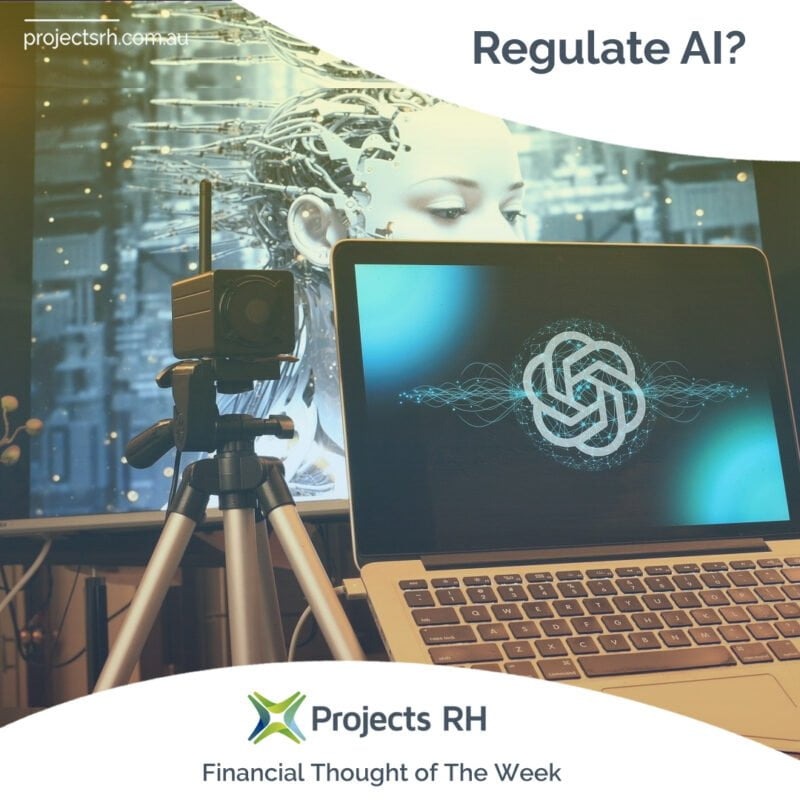Regulate AI? It is here, there, and everywhere.
Regulate AI? It is here, there, and everywhere.

Recent Posts
What is an Investment Teaser?
Information memorandum: A comprehensive guide
What is a pitch deck? Complete guide to a winning presentation
Latin America and the Green Energy Transition
Is the Green Mining Revolution Turning Ore into Opportunity?
AI is here, there, and everywhere.
At Projects RH, we are fortunate to have clients who use AI in the development of their businesses, and others who use AI as an essential part of their business. We are seeing investors wanting both.
We are constantly amazed to see the immediate reaction on a global basis that because we do not understand it, we should regulate it. Next, it is AI. AI has a huge potential to help all of us more in our day-to-day lives and create new opportunities. We are all aware of software packages that anticipate our next word as we type – this is far from the end of AI’s capacity to assist us.
There are many critics of AI who attack it based on the assumption that it will reduce jobs. This is an assertion that continues to be repeated almost like a mantra, but we have no proof of that at all. It is likely that AI will be as fundamental to the world as the development of the wheel, but that does not mean it is bad – the wheel probably created more jobs and improved our standard of living more than any other invention.
It is interesting to ask an AI-based application to prepare a multiple draft company essay or a speech. Clearly, you must be careful in setting the question for it. To my amazement, if you ask the same question at a different time, you can get different answers. In having asked AI to prepare an essay, it is a wonderful place to start, but it is based on the input that it was given. It will give you a researched answer, but now, it does not know how to weigh varying pieces of information it finds inside the space, and it may give you a false answer. AI will learn to help us as individuals.
AI is living within us.
What I have found is that if I ask AI via ChatGPT to produce a paper, it provides a good starting place that can be researched and reworked.
Another criticism that is regularly leveled is that AI makes our students lazy, and they will simply go to the internet to get their answers. However, I think that regardless of intelligence, students today will use the internet to source the materials they need to prepare an intelligent argument. Very few professionals I know would go to books in their library or hard copies of standards to check the accuracy of the information they wish to include. Most professionals have their standards and precedents online. Sadly, as I sit at my laptop, it’s accompanied by two other screens with data and information on them. Such is the way of the world that the bookshelves around my desk are today only touched for pleasure.
Technology is improving our lives, and we need to accept that information gathering, and presentation will also be automated. The critical point is that a skilled professional will review the material produced and edit it according to the needs of the client, given the access to information and the design to get the correct answer. Frankly, I find this not much different from precedents or template documents.
AI and us
What artificial intelligence will never be able to do is replace the initiative of the human mind and its ability to link thoughts and make value-based judgments. There is no doubt that this technology can be misused to create misleading pictures or stories. This is something we already see in our emails and phone messages each day, and we have generally become able to understand when these messages are coming from fraudsters. Equally, we will continue to see photos crafted using technology, and we will have to become smart enough to challenge what we see. No doubt this will become one of the new skills that we all need to learn.
What we are seeing are positive uses of AI to assist people in making applications, to supply the right data, to engage with other parties, and to make communications more effective. The greatest application is in getting references and articles on topics.
For one, I am looking forward to having AI tell me if I have written this news article before or if a competitor has made the same post on LinkedIn. I think we need to be open to change.
At Projects RH, we are seeing that our clients, whether they are technology companies or not, are accepting the huge opportunity that AI offers to eliminate the drudgery of day-to-day work and to allow skilled professional people to focus on value-adding and thinking outside the square.
What we are seeing in Europe and elsewhere is a movement to have AI risk evaluated and to prohibit it from entering areas of so-called ‘unacceptable risk’. Once we have defined ‘unacceptable risk’, the argument is that AI should be banned from working in this area. If it is ‘high risk’, it should be regulated. Even if we are prepared to accept this concept, it will be fascinating to understand who is going to determine what is an ‘unacceptable risk’ and what is a ‘high risk’. I guess we will need another bureaucracy to help us. Regrettably, the proposed regulation of social media has not been able to prevent what it sought to regulate.
Where would we be today if we decided we had to regulate the wheel?
Being in business is not without risk. Most of our clients and their projects are embracing the changing technologies because they know that if they don’t, they run the risk of being left behind. Currently, we are working with two AI-based tech companies, one looking to list in Australia and the other in North America. The potential investors they have found are interested in investing in AI technology.
We need technology to continue growing and reach its potential. It is surprising that in developed countries, our first reaction to anything new is to regulate it. Where would we be today if we decided we had to regulate the wheel?
Paul Raftery, CEO, Projects RH, based in Sydney.
Please feel free contact the author at paul.raftery@projectsrh.com or on +61 418 486 015
——————-
Source: McKenzie, Z.; “We need to regulate high-risk AI without killing innovation”, Technology, The Australian Financial Review, 27 Oct 2023, p. 25.






